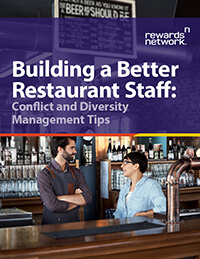At some point, all restaurant managers need to ask themselves an important question:
Is my employee handbook covering enough?
With changing times comes new needs, and we have a guide to expanding your policies, procedures and management skills to better address:
- Conflict resolution between restaurant staff
- How to handle incidents of harassment
- Talking to your Millennial restaurant staff
Download this free eBook today to help develop (or improve) your management approach for a new generation of problems and opportunities among your restaurant staff.
Excerpt from Chapter 1:
Keep it out of the customer eye.
It’s a problem for conflicts in the workplace to consume your staff’s attention, but understand under no circumstances should they be allowed to consume your customers’ attention as well. Visible arguing, fighting, and even micro-aggressions between staff members should be nipped in the bud as soon as they are identified.
Your staff should be instructed as a matter of course to keep their disagreements away from the dining room. If employee conflicts start to interfere with customer service, managers really have no choice about whether to intervene or not. The conflict has already gone too far.
Treat each side equitably and fairly.
Every manager undoubtedly has favorites among their staff, but when it comes to employee conflict, you cannot be anything but objective. Every employee deserves the chance to be heard without pre-judgment and have equal time to present their side, either one at a time in the same space (without interruption) or one by one with the manager privately.
Most important of all as a manager arbitrating employee conflict resolution is not to rely on staff buzz or gossip when judging the situation. Instead, work on getting first person accounts of the problem at hand. Try to keep your attention (and your employees’ attention) focused on facts and actions, not emotions and assumptions. It will help clear the air faster.
Identify the source of the problem.
Often, conflict can develop in such a way as to mask the real issue at hand. Is the issue about work or is it personal? Is it even about the other person involved?
Sometimes employees can bring their personal issues from home to work – it’s hard not to! Something troubling them elsewhere can result in shortness or aggression toward another person in the workplace.
But even when the problem is clearly about something happening in your restaurant, be savvy enough to look past the surface tension. If there’s an underlying cause to the tension, it may extend beyond two (or more) individuals and into your policies as well.
Is your scheduling inequitable or causing tension between employees? Is work being distributed in a way that is perceived as fair? Are privileges being extended to everyone similarly?
Here are a few tips on how to communicate with employees under duress:
“I don’t want you to think that I don’t value your efforts here; I do want to point out that you’ve been causing somewhat of a distraction between ___ and ___. I’d like your thoughts on how we can both ease the tension of the situation.”
“I need to talk with you about ___. The perception from your peers is you’re ___.” (Focus on facts not feelings.)
Find a solution.
This is undoubtedly the hardest part of employee conflict resolution: finding a solution that everyone can be happy with, including you as a manager. That may not always be possible, but strive to land on a solution that incorporates fairness, addresses as many of the stated issues as possible, and has the potential to help avoid future personal conflict.
Once the employees agree on a solution, consider putting it in writing. That way, everyone involved has a touchstone to come back to if they feel the agreement is not being honored, or if they need to remember what they agreed to after the dust clears and tensions lessen. Be sure to communicate who owns the employee conflict resolution and what communication may be required. Remember sensitivity — employees who complain may not take kindly to the offender attempting to make amends.
Focus on (and follow up with) the team.
Ultimately, your restaurant staff is not simply a collection of individuals. They are a team, and they need to function like one for your business to run effectively and efficiently. Remind your staff often that they are their own best resource and that supporting each other — and treating each other with the same level of service and consideration they are expected to give guests — is a base expectation for your workplace.
Rewarding teamwork along with individual accomplishment is one way to encourage harmony and positive conflict while keeping negative conflict and disruption to a minimum. Give your staff every opportunity to be each other’s champions and you’ll likely have to intervene less as a manager with employee conflict resolution, and be able to spend more time building up your business profits and revenue over time.
Deliver feedback that adds value. For example, “I saw/heard this…” and “Next time, what else do you think you could try to improve the situation?”
